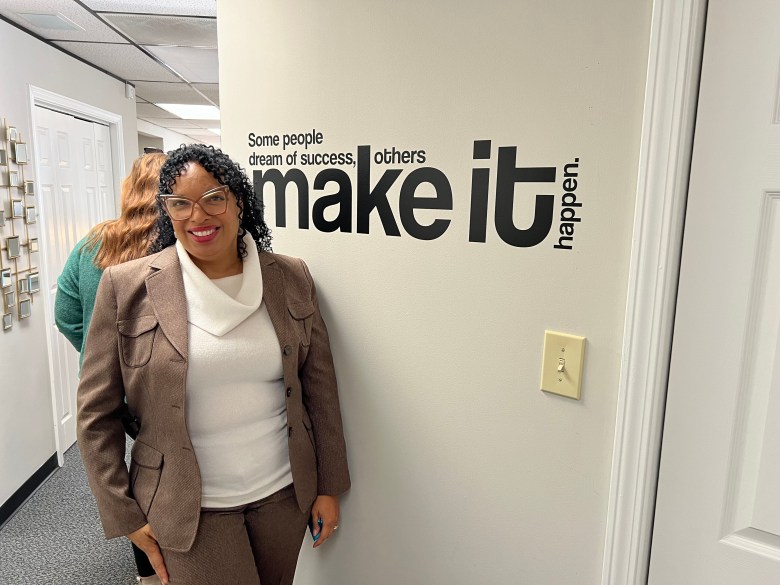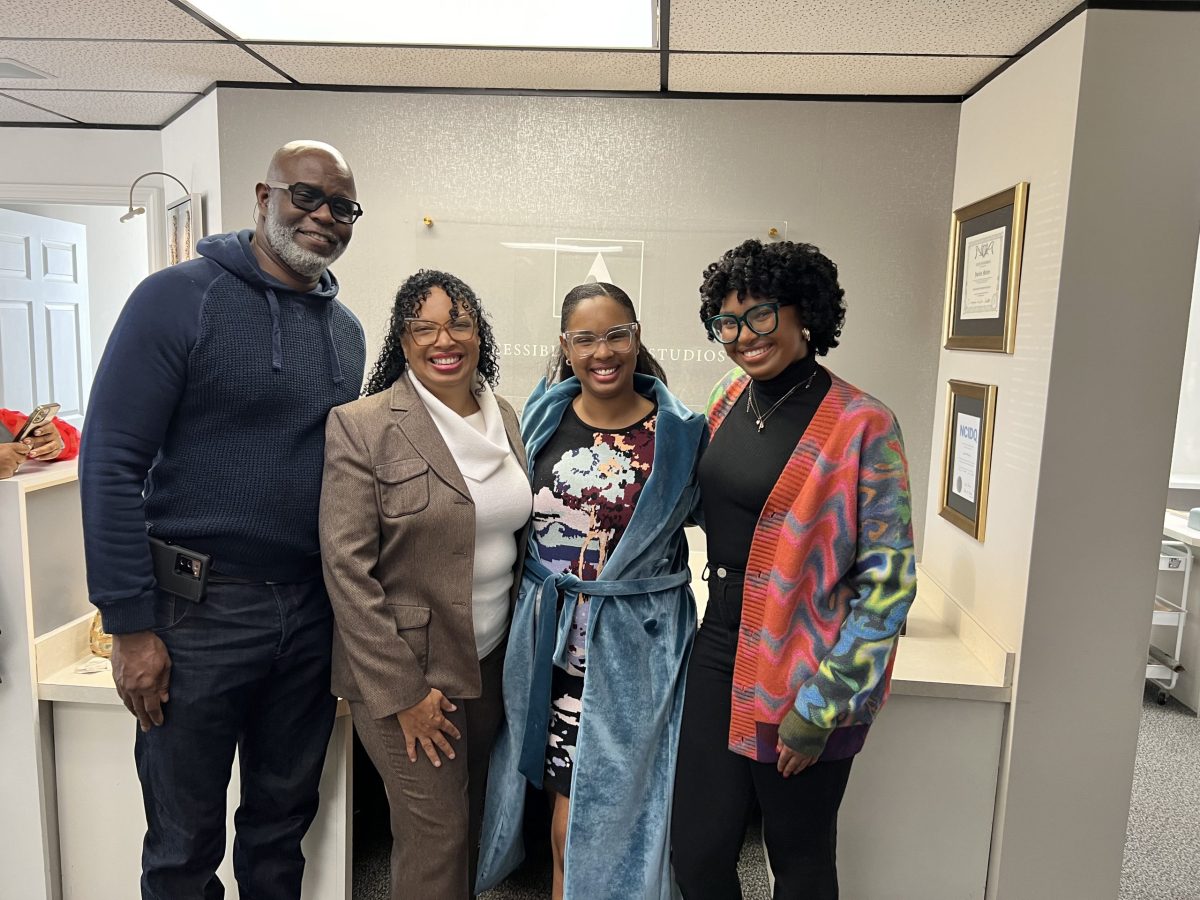Joscelin Mackey, an author, principal designer, and founder of Accessible Design Studios celebrated the grand opening for Fayetteville’s first and only Black-owned commercial interior design firm earlier this month.
Mackey invited the Atlanta metro community to celebrate the studio’s grand opening which included appearances from notable representatives including Fayetteville’s Mayor Edward Johnson, and World Changers Church International CEO and Minister Vernon Harrison.
Attendees also had the chance to participate in a virtual reality experience demonstrating the evolution of technology within the interior design industry.
Accessible Design Studios is one of the roughly 400 registered interior designers in the state of Georgia to receive a license from the Secretary of State to stamp their own non-structural construction drawings for building permits which represents a very small percentage of professional minority women commercial interior designers in the state to hold this designation.

This certification is a major accomplishment for Mackey due to the statistic of there being less than two percent of Black interior designers in the United States, and only a handful of Black interior designers in the Atlanta metro area as of 2023.
Mackey has also been a member of the Fayette County community for over 24 years, is the Director of Community Service for the Rotary Club of Fayetteville, a member of the Fayette Chamber of Commerce, a Professional Member of the International Interior Design Association (IIDA), and a Member of Commercial Real Estate Women (CREW).
Mackey said she is proud to have her first brick-and-mortar location in her beloved city where she’s lived for more than 20 years and completed some of her first projects, including the interior design of a local barber shop, pharmacy, and retail showroom over the past 15 years. Mackey’s projects expand to commercial buildings in the Atlanta metro area and beyond, including medical spas, salons, medical offices, corporate offices, and more.
Joscelin’s husband, Rick, with their two daughters Kelly and Valerie said they are all very happy for Mackey’s accomplishments and hard work.
“I feel extremely proud and happy of my mom,” Kelly said. “This is a big accomplishment for her. I’m just super excited for this new coming for her finally with opening her business to the community and to the world.”
“I’m just super proud that we are another minority of minority business, because not only is she a black woman, but she is also black,” Valerie said. “In an industry that can’t do what everybody in this industry can do, she’s a very small percentage of people, even in the state of Georgia, that can stamp her own plans, which is a huge deal, which is even a smaller percentage of black women that can do that period in the United States of America. So, I’m just excited to be able to bring that into Fayetteville where we’re the only ones in the city of Fayetteville that has that capability. I’m happy to give that to the community and she can share her talents with everyone.”
“That’s my wife and I support everything that she does. I feel like there are so many things, but I’m specifically proud of the fact that this is her baby, and I watched the entire process and entire iteration of how she brought this to life,” Rick said. “I’m proud to say that she’s doing something great, not just for herself, but for the city of Fayetteville and for black women across America.”
Additionally, to help up-and-coming and experienced interior designers continue to grow in the industry, Mackey has developed a book titled “Designing for the Senses, a Neuroscientific Exploration of Interiors”.
Mackey wrote this book to enlighten designers and design enthusiasts on the influence the built environment has on the mental, emotional, and physiological well-being of its users. She also recognizes that the design of spaces is not merely an aesthetic endeavor but a powerful tool for shaping human experiences.
Q&A with Joscelin Mackey:
The Atlanta Voice: How are you feeling about opening your first interior design studio?
Joscelin Mackey: It’s like birthing a baby. I started in two design years and years ago but moved into this building right after COVID. So, the ribbon cutting has been a long time coming. At least six months. Opening an interior design studio has been a longtime dream of mine and I’m honored to be part of a small number of Black interior designers in the country who were able to take interior design to the next level. I’m also appreciative of my clients who’ve trusted me with their vision for their businesses over the past 15 years. My clients have encouraged me to continue the work as a trailblazer in the interior design industry and I look forward to encouraging more up-and-coming Black interior designers to stake their claim in the industry.
AV: Why did you decide to start Accessible Design Studios?
JM: When I graduated initially from Interior Design School back in 2011, that was during the recession. During that time, I had to get out and find business because no one was hiring. So, I’ve always been kind of entrepreneurial anyway. When COVID hit and Delta said that they weren’t laying anyone off, they let everyone go who had contracts and so I was contracted. So, I said, well, I know what to do and so I just put my stake in the ground and said, I’m just going to step back.
AV: Was there a moment that inspired you to start Accessible Design Studios?
JM: Probably COVID. I’m sure if not, I probably would still be working on projects. I was designing Delta Sky Clubs as part of that team, traveling a lot and so if it had not been for COVID, just making me slow down and ask myself, ‘what is it that I really want to do or what should I be doing, what would be doing that?’ I think that you need an interruption in life to kind of focus.
AV: Why did you think it was important to include a virtual reality experience demonstrating the evolution of technology within the interior design industry?
JM: There’s nothing like being in your own space. So, I can show you construction drawings because I do those. You probably wouldn’t be able to read them right now trying to describe them or I can draw a drawing or give you something two dimensional or even try to do like a three-dimensional rendering and that might take you to the place, but it’s not. When you put those goggles on and you can feel like you’re interacting with the space that we’ve created for you, that you get a real sense of what’s going on and what you’re looking at right there. That’s kind of just like the sketch, but once you put the goggles on, then you can color, you can move through the space.
AV: What was your idea and intention behind your book, “Designing for the Senses: A Neuroscientific Exploration of Interiors”?
JM: Most people, when they think of interior design, they get interior designer and decorating kind of misconstrued. To do what I did, you go to school for four years and to become a registered interior designer and you must take an exam? It’s the NCIDQ. It’s an 11-hour exam with three parts. So, in that process, you’re learning about health and safety. Then, in school, you learn about health and safety, and then you start realizing that is not enough to be aesthetically pleasing and it’s not enough to be functional. However, there are real people interacting with real space that have real needs. So, your neurological system is affected by lighting, affected by smell, and just in all your senses. Interior designers have a responsibility to design spaces that are about the safety and welfare and so that’s why I wrote the book.
AV: Mackey of Accessible Design Studios is one of the roughly 400 registered interior designers in the state of Georgia to receive a license from the Secretary of State to stamp their own non-structural construction drawings for building permits which represents a very small percentage of professional minority women commercial interior designers in the state to hold this designation. How do you feel about this?
JM: That’s not good enough, right? We have for one, as an interior designer, have a lot to just get a name. Our name is owned by decorators, and we must continuously say ‘I’m like an interior architect because I can start writing instruction guides, but we can’t use the word architect because it’s protected, and our title is not protected. We just get the word registered before it. So, for one, there’s not enough understanding about our specific niche in interiors. Only 2% of all interior designers, including decorators within the country, are black and that’s just not enough either, because we need to be represented. Unless you have a proper sampling of what is the United States, then you’re not getting diverse environments. So more of us need to become schooled more less need to become educated through certification and more of us need to become registered.
AV: How does it feel to be part of a small number of Black interior designers in the country who were able to take interior design to the next level?
JM: Sometimes it’s a lonely walk, right? Because not only is this a white-dominated industry and an interior design is a white-woman dominated industry, and architecture is a white man dominated industry. So, sometimes when you want to have real conversations about issues it’s hard to find.
AV: What do you think you can do to be able to do to bring more people of color into the interior design industry?
JM: I wrote my book, but also, I’m working on creating a platform to begin speaking to get a larger mic and platform. I’m going to begin using that to talk to more of us to kind of shine the light in schools where children don’t even know that this is an opportunity. I know our children don’t know that this is an opportunity or even what it is. So, it’s just finding that stage. Getting that large money and hiring more people that look like us.
AV: What are your business goals for 2024?
JM: Well, currently, I have this building with two sides (A and B). So, once I hire a few designers, which is the goal, and to get some more projects going as we move into this year to expand and to begin to develop on the other side of our office space.
AV: Any advice to future business owners about taking the plunge?
JM: There are a few things about being an entrepreneur I want future business owners to know. You must be a person who is tenacious, one that doesn’t understand the word ‘no’ because it doesn’t exist. Also, be a person with grit because you’re going to need the stick-to-it-ness in a person that knows how to surround themselves with the right people. If you have those things, then you have an advantage and if you don’t, maybe you need to work for those that do.
Mackey’s book can be purchased on Amazon, or at accessibledesignstudios.com.

